5 Reasons The Flash Is Better Than Arrow
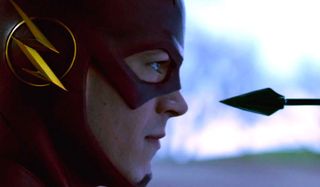
The Flash and Arrow are shows that are intrinsically linked – what with sharing creators, a universe, and a network together – but they are at the same time fundamentally different shows. As a result of this, fans have made a habit of weighing the positives and negatives of each against each other, stacking pros and cons to determine which one is actually the superior program. A few days ago, my colleague Laura Hurley argued on behalf of the Battling Bowman’s long-running series, but now I’m here to explain both why and how the show about the Fastest Man Alive has outpaced its predecessor.
Cutting straight to the point, I’ve put together five arguments as to why The Flash is now a much better show than Arrow, and by the time you’re done reading, I’m sure that you’ll agree with me.
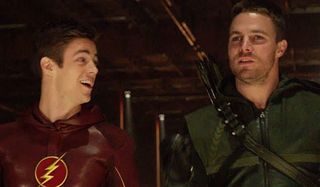
It's Actually Fun
If there’s one key word that can define the difference between The Flash and Arrow, that word would be “fun.” The latter series was built out of the Christopher Nolan School For Comic Book Adaptation, which is absolutely legitimate, but the latter is built to reflect the beautiful and wonderful energy possessed by its lead characters. Despite the tragedies that they’ve experienced together, the Star Labs crew is a happy, smiling group that knows when it’s time to be serious and when it’s time to crack jokes and give supervillains goofy nicknames. It’s magnetic, and it’s what makes the show enjoyable to watch.
Sadly, Arrow has just become dourer as seasons go on, and the direct comparison to the tone of The Flash definitely doesn’t help things. Oliver Queen is still giving the same old lecture about not letting the darkness out and not killing, only this time it’s Thea instead of Roy, and the rage is caused by the effects of the Lazarus Pit instead of Mirakuru. Even Felicity’s smile and bright peppy attitude has disappeared under a mountain of corporate responsibility and constantly worrying about her superhero boyfriend.
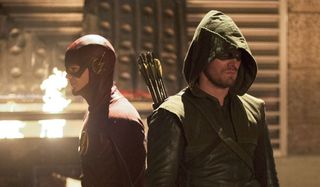
It Keeps The CW-Style Romantic Melodrama To A Minimum
Born out of The WB, which was built on a foundation of shows like Dawson’s Creek, 7th Heaven, Felicity and Charmed, The CW has a long history of strongly appealing to a teenage girl audience – and over the years we’ve seen some of the sensibilities of that particular demographic leak into both Arrow and Flash in the form of romantic melodrama. But while the Scarlet Speedster’s show has kept those elements to being the occasional drip, the Emerald Archer’s often feels like it’s turning on a faucet.
CINEMABLEND NEWSLETTER
Your Daily Blend of Entertainment News
The potential for a romantic relationship between Barry Allen and Iris West was an annoying and somewhat forced plotline in the first season of The Flash, but at this point the show is taking a reasonable step back (what with the death of Eddie Thawne, and all) and has been creating more of a family bond between the central characters. Meanwhile, Oliver has slept with just about every female member of the core cast (the obvious exception being Thea), and conversations about the dangers of superhero work are constantly put on repeat, said by different characters each time out. It’s become exhausting, and a detriment to the show.
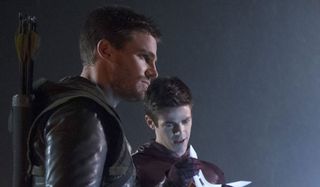
It Doesn’t Have A Lame Narrative Device Tying It Down
When Arrow first started out, the Lost-esque flashback storytelling made a good amount of sense for the show. It not only educated audiences about how Oliver Queen went from being a lazy playboy to a criminal-killing vigilante, and effectively informed the modern day story. At this point, however, the flashback structure has become the largest albatross around the show’s neck, offering little productive information for the story being told, while also being tremendously boring, and simply not dealing with anything similar gives The Flash a creative advantage over its predecessor.
Large chunks of Arrow’s runtime are forcibly dedicated to what are really naturally insignificant stories (if they were more important, they would have had more notable perceived consequences by this point), and meanwhile The Flash has the freedom to dedicate that same kind of time to advanced science-fiction ideas or flashbacks that actually matter. The good news is that Oliver Queen was only presumed dead for five years, so that nonsense should be over by the time Season 6 rolls around.
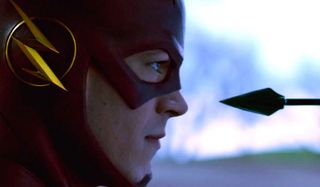
Monster Of The Week Works Better Than Serial Drama
While serial dramas excel on cable – where seasons are limited to be between 10 and 15 episodes, it doesn’t work quite as well on network television where orders can be nearly twice as big. Within the last couple of years, this has developed into being a problem for Arrow, in that many episodes make it feel like the series is spinning its wheels as a result of being short on plot. How has The Flash managed to avoid this same curse? By utilizing a “Monster of the Week” method that keeps the show regularly introducing new elements and feeling fresh.
This is also an area where The Flash has developed and evolved supremely well. The setup of Season 1 – where the Star Labs explosion created a number of different metahumans – could have easily been stretched into Season 2, but the writers instead made the smart call of essentially having Earth 2 serve the same function. The Monster of the Week style continues onward, while a whole new plot is introduced to make the show feel completely different than what we’ve seen before. Speaking of which…
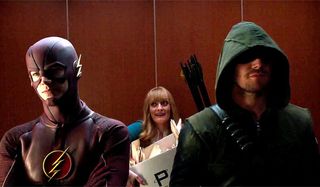
It's Thinking Bigger And Smarter
In the three seasons of Arrow that we’ve seen so far, the show hasn’t made any effort to actually grow upon its original setup. Characters of hero and villain persuasion have come and gone, sure, but ultimately the show is just about Oliver Queen trying to make his city a better place, while often-irrelevant flashbacks occasionally break up the action. The formula has gotten tired and needs to change – and The Flash is proving to be a perfect role model.
While Season 1 of The Flash featured the titular character taking care of the metahuman problem in Central City, while also working to exonerate his dad, Season 2 in its early episodes has already completely changed the game by bringing in Jay Garrick and the villains of Earth 2. It’s an area rich with potential of which we haven’t even seen the surface scratched, and it offers an endless number of exciting conclusions to be reached via interdimensional and time travel. That’s a hell of a lot more interesting than seeing Damien Darhk fill the villain slot vacated by Ra’s al Ghul, Deathstroke, and Malcolm Merlyn before him.

Eric Eisenberg is the Assistant Managing Editor at CinemaBlend. After graduating Boston University and earning a bachelor’s degree in journalism, he took a part-time job as a staff writer for CinemaBlend, and after six months was offered the opportunity to move to Los Angeles and take on a newly created West Coast Editor position. Over a decade later, he's continuing to advance his interests and expertise. In addition to conducting filmmaker interviews and contributing to the news and feature content of the site, Eric also oversees the Movie Reviews section, writes the the weekend box office report (published Sundays), and is the site's resident Stephen King expert. He has two King-related columns.
Most Popular



